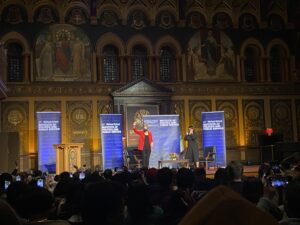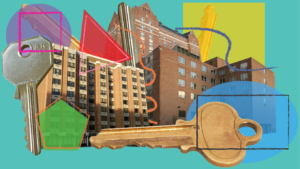Georgetown’s COVID-19 test numbers from the week of Jan. 9 have been released, revealing that of the 5,267 students tested, 342 tested positive. The university’s 6.49 percent positivity rate dropped to 4.24 percent the week of Jan. 16 and has remained at that number, despite more students returning to campus.
As the national positivity rate began to increase due to the Omicron variant, the university began responding to the situation. On Dec. 29, Georgetown officially announced its plans for the spring semester, saying that classes will temporarily be conducted virtually.
Most classes returned to in-person instruction on Jan. 31. Classes containing over 100 students, however, will remain online until Feb. 15.
Although the decision to start the semester virtually was taken in the interest of public health, students were disappointed to continue their education online. “Online classes are already getting a little exhausting,” Christina Landau (COL ’25) said.
Due to the virtual nature of the semester’s start, students were offered the choice of returning to campus on Jan. 11, as initially planned, or later on in the month. The university also suggested that staff members telework from home to limit the number of people on campus. “In the period before January 31, staff members who are able to telework are encouraged to do so as much as possible,” President John J. DeGioia wrote in an email.
The university has published certain protocols and checklists regarding COVID-19 testing based on whether students are coming from within or outside of the DMV area. The information, along with testing center hours of operation, can be accessed on Georgetown’s COVID-19 Resource Center website.
When checking in, students were given an N95 mask and a rapid test kit to be done immediately upon getting to their dorm room. All students were also required to receive a PCR test when arriving on campus.
Georgetown’s policy regarding the booster shot has also changed. As of Jan. 21, all students, faculty, and staff were required to receive the booster, unless they have approved medical or religious exemption. Proof of vaccination must be uploaded to the GU360 website. Students and faculty who are eligible for the booster but have not yet received it due to medical or religious reasons will be required to get tested once a week.
“We strongly recommend that everyone get a booster shot as soon as they are eligible,” Dr. Ranit Mishori, Georgetown’s Chief Public Health Officer, wrote in an email.
Georgetown will maintain its testing policy from fall 2021, requiring students who are not fully vaccinated to get tested twice a week. Starting Jan. 31, the university resumed weekly asymptomatic testing, requiring a randomly selected pool of vaccinated community members to get tested. Some argue that, with the rise in Omicron cases, all students should be required to get tested weekly, as seen at schools like Howard University and Cornell University.
“You just know each week that you’re safe if you’re negative, and it allows many more students to feel at ease,” Landau said about mandating weekly testing.
In the event of a positive test result, students will be isolated at the Georgetown University Hotel and Conference Center. The university currently has 300 beds available for isolation purposes with some being at the Georgetown University Hotel and Conference Center and others being at an external hotel nearby.
“While we are currently able to accommodate isolating all students in hotel single-occupancy rooms, we informed students on January 10 that they should be prepared to isolate with another student in a hotel room or in their campus residence,” a university spokesperson said.
Over break, the university also informed students of its initial strategy to have students isolate in their on-campus residence if the number of cases was to exceed the number of beds available. “Students who had a private bathroom and no roommates when they returned earlier in January had been allowed to isolate in their residence. If verification by Care Navigators determined that the student did not meet these conditions, they were required to move to the hotel immediately,” a university spokesperson said.
A graphic posted on the Georgetown Student Health Center Instagram takes students step-by-step through what they must do if they have been in contact with anyone with COVID-19, have symptoms, or test positive themselves. Those who test positive are asked to remain in isolation for ten days and to have limited contact with other people.
The protocols implemented at the beginning of the semester have also affected on-campus activities and services. For instance, Yates Field House and the Lauinger Library Circulation Desk are temporarily required to have limited hours of operation. The concern has been especially with Yates as it was completely closed until Jan. 21, causing the student employees under the work-study program to lose out on money they rely on.
“When we had the notice that they were going to close early last semester and not finish out the week before the holiday break, they were considering compensating students that were supposed to work, but they ultimately didn’t,” Priscila Putzulu (COL ’25), a current work-study employee at Yates, said.
An email from Jeanne Lord, interim vice president for Student Affairs and Dean of Students, informed members of the Georgetown community that Yates will be reopening for a reduced number of hours to active degree-seeking students, faculty, staff, and MedStar Health members.
Yates will also function under limited capacity, with a maximum of 300 users at a time. In-person group fitness classes, lessons, intramurals, and other programming will be temporarily suspended, and the basketball courts will be closed.
“I work at the front desk most times, so rather than just scanning people, I also have to check with the counter to make sure we are not letting too many people in. Sometimes there are long lines, and that can be really frustrating since no one really understands why they have to wait,” Putzulu said.
The initial plan was to return to normal hours of operation on Jan. 31, but an email from Provost Robert M. Groves stated that this date will be pushed back to Feb. 11.
“Sometimes there’s miscommunication between the higher authorities and the employees and that can be kind of frustrating, but everyone has been cooperating pretty nicely and helping each other out,” Putzulu said.





